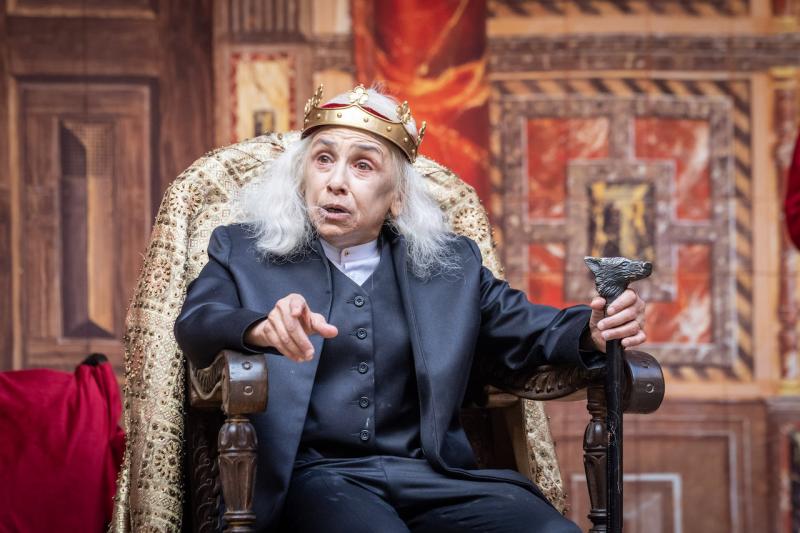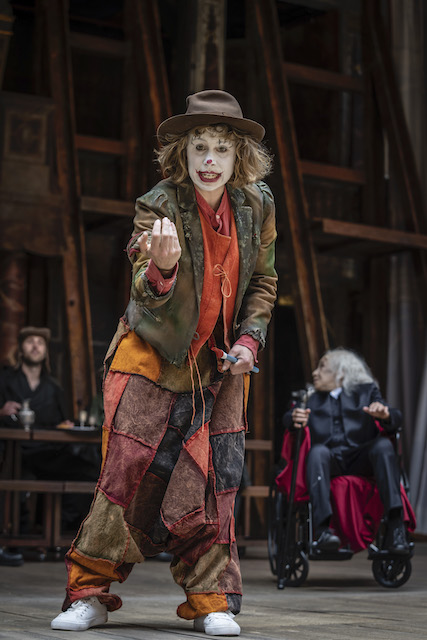King Lear, Shakespeare's Globe review - eviscerates emotionally while illuminating a society rotten with lies | reviews, news & interviews
King Lear, Shakespeare's Globe review - eviscerates emotionally while illuminating a society rotten with lies
King Lear, Shakespeare's Globe review - eviscerates emotionally while illuminating a society rotten with lies
The disconnect between rhetoric and genuine meaning feels very contemporary

Kathryn Hunter’s performance as Lear forges its heat from contradictions. She is as frail as she is strong, as detestable as she is loveable, as powerfully charismatic as she is physically diminutive. That she is a woman playing a man is the least extraordinary aspect of what she achieves in this production.
Hunter famously first played Lear in 1997 at a moment when discussions about gender and identity were at a very different level to where we are now. Yet even then, she and her director Helena Kaut-Howson were explicit that while casting a woman as Lear felt more radical, they weren’t making a feminist statement so much as exploring the universality of what Lear means.
That sense of using her life experience to explore every subtle nuance of the text perpetuates here; seeing her return to the role is not unlike, say, watching Glenn Gould revealing different interpretations of the Goldberg Variations throughout his career. Here we see someone responding not just to the fear of cognitive decline, but to the way our perceptions of ageing and vulnerability have been rewritten by the ravages of the pandemic.
One particularly powerful point is in the iconic moment when Cordelia refuses to assert her love; in Lear’s bewildered anger we see her unsure whether Cordelia’s words are a straightforward defiance of expectation or a cruel hallucination induced by dementia. At a later point in Act I when she declares "Does anyone here know me?" we see the absolute terror of an individual who is not even sure if she knows herself.
As in 1997, Kaut-Howson directs. In an interview in the programme she explains that where for Hunter this is the continuation of a process that has included playing the Fool for the RSC, for her it’s “the end of a journey”. Yet there’s no sense of collapse in this vivid, pared-back production. While an accident has meant that Kaut-Howson could not attend the last two weeks of rehearsals, the relatively minimal effects mean that the performances and language are allowed to do the heavy lifting.
 With a cast this talented, that pays off. Though the allusions to today’s politics are much more subtle than in the Globe’s gleefully obscene Henry VIII, when the play explores the disconnect between self-serving rhetoric and genuine meaning the contemporary resonance feels clear. As one character after another is sickened by the weasel words of those in power and takes to the heath, once more we see our fractured world reflected in Shakespeare’s imagination.
With a cast this talented, that pays off. Though the allusions to today’s politics are much more subtle than in the Globe’s gleefully obscene Henry VIII, when the play explores the disconnect between self-serving rhetoric and genuine meaning the contemporary resonance feels clear. As one character after another is sickened by the weasel words of those in power and takes to the heath, once more we see our fractured world reflected in Shakespeare’s imagination.
Beyond Hunter’s resonant central performance, Ryan Donaldson’s Edmund stands out for his anarchic charisma, epitomised not least by the contempt with which he imbues the word "legitimate". Ann Ogbomo’s Goneril is strong and dignified – we see both the grit and the pain when Lear tries to curse her with sterility and how this in turn leads to the actions that follow. The Globe’s Artistic Director Michelle Terry plays both Cordelia and one of the most melodious Fools I’ve seen (pictured above); in the latter role especially she exudes a humanity that gives the “jokes” full resonance. Meanwhile as Edgar, Kwaku Mills translates compellingly from guarded geek to feral protester.
Given Hunter’s Complicité pedigree it’s worth reflecting on the physical detail of her performance, not least since her husband and Complicité co-founder Marcello Magni is a creative collaborator here. There’s one particularly strong point when you feel the full force of her former power as she starts to move slowly and rhythmically and the whole court echoes her movement, as if controlled by her tempo. At other times it’s simple gestures like the way her whole body curves over to listen to Edgar as Poor Tom. In such muscular attentiveness we see the fellowship she feels with his sense of rejection and resulting insanity.
For the political inevitably translates into the personal, and this is a production in which, overall, the sense of lost love is as damaging as any deeper corruption. One of the most poignant moments of the evening is watching Edgar’s/Mills's face as he watches his father believing he is about to throw himself off a cliff. In a regime where cynical rhetoric allows the unscrupulous to do as they want, for victims oblivion can seem preferable to reality. Through such telling details we see a whole world implode.
rating
Explore topics
Share this article
The future of Arts Journalism
You can stop theartsdesk.com closing!
We urgently need financing to survive. Our fundraising drive has thus far raised £49,000 but we need to reach £100,000 or we will be forced to close. Please contribute here: https://gofund.me/c3f6033d
And if you can forward this information to anyone who might assist, we’d be grateful.

Subscribe to theartsdesk.com
Thank you for continuing to read our work on theartsdesk.com. For unlimited access to every article in its entirety, including our archive of more than 15,000 pieces, we're asking for £5 per month or £40 per year. We feel it's a very good deal, and hope you do too.
To take a subscription now simply click here.
And if you're looking for that extra gift for a friend or family member, why not treat them to a theartsdesk.com gift subscription?
more Theatre
 Ragdoll, Jermyn Street Theatre review - compelling and emotionally truthful
Katherine Moar returns with a Patty Hearst-inspired follow up to her debut hit 'Farm Hall'
Ragdoll, Jermyn Street Theatre review - compelling and emotionally truthful
Katherine Moar returns with a Patty Hearst-inspired follow up to her debut hit 'Farm Hall'
 Troilus and Cressida, Globe Theatre review - a 'problem play' with added problems
Raucous and carnivalesque, but also ugly and incomprehensible
Troilus and Cressida, Globe Theatre review - a 'problem play' with added problems
Raucous and carnivalesque, but also ugly and incomprehensible
 Clarkston, Trafalgar Theatre review - two lads on a road to nowhere
Netflix star, Joe Locke, is the selling point of a production that needs one
Clarkston, Trafalgar Theatre review - two lads on a road to nowhere
Netflix star, Joe Locke, is the selling point of a production that needs one
 Ghost Stories, Peacock Theatre review - spirited staging but short on scares
Impressive spectacle saves an ageing show in an unsuitable venue
Ghost Stories, Peacock Theatre review - spirited staging but short on scares
Impressive spectacle saves an ageing show in an unsuitable venue
 Hamlet, National Theatre review - turning tragedy to comedy is no joke
Hiran Abeyeskera’s childlike prince falls flat in a mixed production
Hamlet, National Theatre review - turning tragedy to comedy is no joke
Hiran Abeyeskera’s childlike prince falls flat in a mixed production
 Rohtko, Barbican review - postmodern meditation on fake and authentic art is less than the sum of its parts
Łukasz Twarkowski's production dazzles without illuminating
Rohtko, Barbican review - postmodern meditation on fake and authentic art is less than the sum of its parts
Łukasz Twarkowski's production dazzles without illuminating
 Lee, Park Theatre review - Lee Krasner looks back on her life as an artist
Informative and interesting, the play's format limits its potential
Lee, Park Theatre review - Lee Krasner looks back on her life as an artist
Informative and interesting, the play's format limits its potential
 Measure for Measure, RSC, Stratford review - 'problem play' has no problem with relevance
Shakespeare, in this adaptation, is at his most perceptive
Measure for Measure, RSC, Stratford review - 'problem play' has no problem with relevance
Shakespeare, in this adaptation, is at his most perceptive
 The Importance of Being Earnest, Noël Coward Theatre review - dazzling and delightful queer fest
West End transfer of National Theatre hit stars Stephen Fry and Olly Alexander
The Importance of Being Earnest, Noël Coward Theatre review - dazzling and delightful queer fest
West End transfer of National Theatre hit stars Stephen Fry and Olly Alexander
 Get Down Tonight, Charing Cross Theatre review - glitz and hits from the 70s
If you love the songs of KC and the Sunshine Band, Please Do Go!
Get Down Tonight, Charing Cross Theatre review - glitz and hits from the 70s
If you love the songs of KC and the Sunshine Band, Please Do Go!
 Punch, Apollo Theatre review - powerful play about the strength of redemption
James Graham's play transfixes the audience at every stage
Punch, Apollo Theatre review - powerful play about the strength of redemption
James Graham's play transfixes the audience at every stage
 The Billionaire Inside Your Head, Hampstead Theatre review - a map of a man with OCD
Will Lord's promising debut burdens a fine cast with too much dialogue
The Billionaire Inside Your Head, Hampstead Theatre review - a map of a man with OCD
Will Lord's promising debut burdens a fine cast with too much dialogue

Add comment